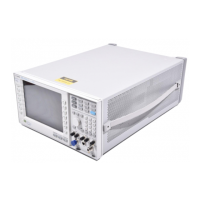93
S:\Hp8960\E1962B CDMA 2000\Pi Release\Reference Guide\Chapters\cdma2000_gen_bse_fch.fm
Configuring the F-FCH/Traffic Channel (Forward Fundamental/Traffic Channel)
Configuring the F-FCH/Traffic Channel (Forward Fundamental/Traffic
Channel)
The F-FCH (traffic) channel parameters are configured using the following call processing subsystem
functions and commands.
Settable F-FCH Parameters
• F-FCH level.
• F-FCH state.
• F-FCH Walsh code (call status state must be idle).
• F-FCH data rate (see “CALL:TRAFfic:DRATe” )
GPIB Examples:
Setting the F-FCH level and state (complex command)
OUTPUT 714;"CALL:FCH -10 DB"
would set the F-FCH state to on and set the F-FCH power level to −10 dBm. See
“CALL:FCHannel[:SLEVel][:SELected]” .
Setting the F-FCH Walsh code
OUTPUT 714;"CALL:FCH:WALSH CODE14"
would set the F-FCH Walsh code to 14. See “CALL:FCHannel:WALSh” .
Operating Considerations
The terms traffic and fundamental channels are used interchangeably within IS-2000. Commands that control
parameters for either code channel control both. For instance, setting the data rate using the “CALL:TRAFfic”
commands set the data rate for the fundamental channel.
When changing F-FCH Walsh codes, the call processing state must be idle.
If the data rate is changed while an echo service option is selected, the data rate value will be stored for use
when a loopback service option is selected.
Parameters can be queried from the test set regardless of the state of the test set.
Related Topics
“CALL:FCHannel”
“CALL:TRAFfic”
“How Do I Change Code Channel Levels?”

